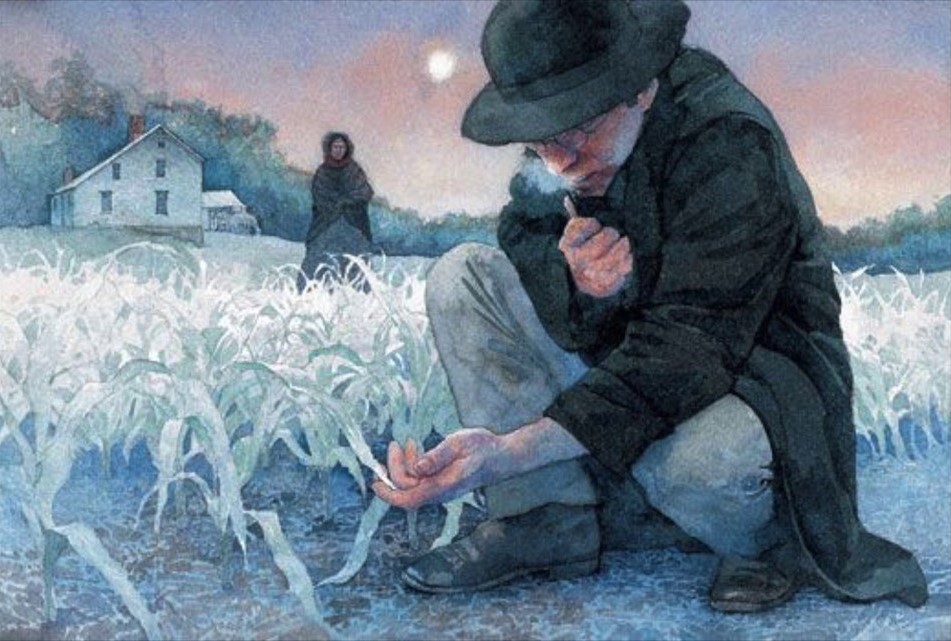Climate Change, Rising Food Prices… it must be 1816

In November of 1815, James Libby married Mehitable Low of Lyman. James’s father, William (son of Daniel Libby, founding settler of Gray) lived at the foot of Libby Hill Road on Route 26. His house foundation lies where the Gray Hannaford, built in 2012, now stands. William gave James land as a wedding gift, on what now are the Libby Hill Trails and adjacent properties on top of Libby Hill1.
There is no documentation of when or how James may have cleared the land on top of Libby Hill. It is possible that the land may have already been cleared by his father. Wool demand was just picking up at this time to feed the Mayall Mill in Gray and many of the hills that box in the valley of Gray were cleared to provide pasture for sheep. Regardless, James started working on setting up a house lot at the current location of the cellar hole on top of Libby Hill. We do know that the winter of 1815-1816 was warmer than normal and the spring began cooler and dryer than usual. It is likely that this would allow James to begin work on his new farm earlier than normal that year.
James also didn’t have time to plant crops in the spring of 1816 but those in Maine who did, had their early seedlings killed by a heavy frost in late May. June started out warm in the 70s and 80s but on June 8th most of New England got six inches of snow2! Two weeks later, a heat wave struck, and crops were replanted once again. July brought more heavy frosts killing most crops once again with less than 10% of the corn crop surviving. Rain was also scarce that summer impacting hay production resulting in shortages in food production for animals in people. It must have been a very terrifying summer for people of the time. While we worry about $5 per gallon heating oil, people of that time were looking at how they were going to find food for winter. Needless to say, it was a hard year for James to be making his way in the world when many felt the end was near.
The severe weather continued with heavy frosts in August and snowfalls every month of the year in 1816. It became known as “The Year without a Summer3” or “Eighteen Hundred and Froze to Death”. Scientists now believe the cause was the eruption of a volcano, Mt. Tambora, in Indonesia. This eruption was the largest in 2000 years and spewed massive quantities of ash into the atmosphere which impacted the climate in the summer of 1816. Over the next year the largest famine in the 19th century impacted the northeast, maritime Canada, and northern Europe.
Despite all the trouble in James’s world, he somehow kept going. He somehow established his farm and fed his new family. Because it predated photographs we have little record of how hard things were in Gray in 1816. We do have one lasting reminder though, Egypt Road. The Egypt Road was named by folks in East Raymond who used the road to come to Gray to get seed corn in the spring of 1817. One section of town between Colley Hill and the Mayall Road was fortunate enough to have its corn crop survive in 1816. Seed corn was provided to some neighboring Raymond citizens, and they named the road “Egypt” since they compared the deliverance from Egypt by Moses to the kindness of some farmers in Gray4.
While I wonder how our world will turn out in the coming years, I try to imagine how daunting the world of 1816 must have been for James Libby. He made it through those tough times as we will make it through the coming challenges that face us. The next time you make it up Libby Hill, peek at the old cellar hole and contemplate what it took to put it there.
1 The Libby Family in America 1602-1881. Libby, Charles Thornton page 473
21816 The Year Without a Summer – http://www.mainestory.info/maine-stories/winter.html
3The Year Without a Summer – https://en.wikipedia.org/wiki/Year_Without_a_Summer
4History, Records, and Recollections of Gray, Maine – George T. Hill, pg 70.
